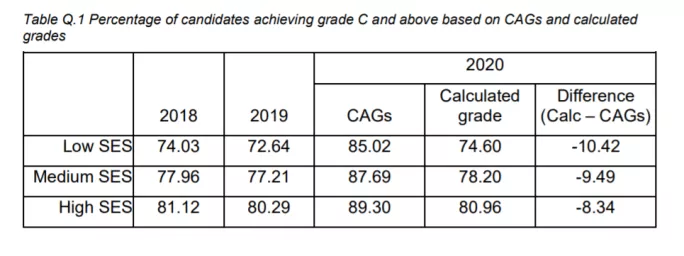- Home
- A levels 2020: ‘No bias’ in grading, Ofqual says
A levels 2020: ‘No bias’ in grading, Ofqual says

There is “simply no evidence” of bias in the process for calculating this year’s A-level grades, Ofqual has said.
This is despite the fact that the regulator’s statistics show a higher proportion of poorer pupils were knocked out of the A*-C bracket after teacher assessed grades were moderated.
Asked by Tes at this morning’s results briefing if, like Scotland’s exams regulator, it had done any analysis on the proportion of teacher assessments downgraded for disadvantaged students compared with their peers, Ofqual said it found “simply no evidence of systematic bias”.
A levels 2020:
- Vast majority of A-level changes reduced teacher grades
- Teachers praised for grading accuracy
- Record percentage get top A* grade
It added that there has been a “tendency for generosity” among teachers when assigning grades to poorer pupils.
Ofqual data shows that the cut in the proportion of entries from poorest students getting a C or above after teacher grades were changed was 10 percentage points, compared with 8 pointa for the richest students.
In Scotland, the gap - which led to the controversy that prompted ministers’ U-turn in deciding to keep teacher grades - was much bigger.
Asked whether there had been socioeconomic inequalities in the changing of teacher-assessed grades, Michelle Meadows, Ofqual’s deputy chief regulator, said: “There has been no bias in the model this year.
“The outcomes for different groups - whether that be by socioeconomic status, ethnicity, gender - are very similar to those in previous years.”
She later added: “We’ve done a great deal of analysis on these final calculated grades to ensure that there is no evidence of bias.
“We have also looked at centre assessment grades, so you’ll be able to see in the information that we publish this morning, and analysis, according to socioeconomic status.
“What I’d like to say about that is that it’s important to remember that what the research literature shows on A-level predictions for university entrants is that there is a tendency to be more generous for students from lower socioeconomic status.
“So there will be a tendency for there to be more generosity. We’ve provided that analysis for you.”
Dr Meadows added: “I think the important thing, of course, is to look at the analyses for calculated grades - those end grades that students take away. And you can see there that there is simply no evidence of systematic bias.”
Data released by the regulator today shows that the proportion of students with a low socioeconomic background achieving grade C or above before moderation was 85.02 per cent.
After moderation, this was reduced to 74.6 per cent - a fall of 10.42 percentage points.
This decrease was slightly greater than for students with a medium socioeconomic background (9.49 per cent) and those with a high socioeconomic background (8.34 per cent).

In its analysis, Ofqual said: “It is difficult to draw firm conclusions on the basis of this analysis, for several reasons:
- We know that different centres have varied in the extent of the generosity of the CAGs [centre-assessed grades] submitted and the analysis takes no account of that.
- Research shows that teachers have a tendency to over-estimate to a greater extent the grades of socioeconomically disadvantaged students
- The outcomes in all three years are higher for students with high socioeconomic status and therefore there is less scope for overgenerous CAGs than for students with lower socioeconomic status who, in general, tend to have lower outcomes overall.
“Nevertheless, the differences between the three groups are relatively similar.”
In Scotland, disadvantaged students saw a significantly disproportionate fall in their Higher pass rate after teacher estimates were moderated by the Scottish Qualifications Authority (SQA) this year.
The pass rate for the most disadvantaged students fell by 15.2 percentage points - far more than for the least disadvantaged (6.9 percentage points).
That difference prompted those who had been campaigning for a system that is fair for all this year to conclude that the poorest young people were “over twice as likely to have their Higher downgraded from a pass to a fail than their most affluent peers”.
Scottish education secretary John Swinney later took the decision to base the results this year on teacher estimates unless the moderation process had resulted in an upgrade.
Register with Tes and you can read two free articles every month plus you'll have access to our range of award-winning newsletters.
Keep reading with our special offer!
You’ve reached your limit of free articles this month.
- Unlimited access to all Tes magazine content
- Save your favourite articles and gift them to your colleagues
- Exclusive subscriber-only stories
- Over 200,000 archived articles
- Unlimited access to all Tes magazine content
- Save your favourite articles and gift them to your colleagues
- Exclusive subscriber-only stories
- Over 200,000 archived articles



